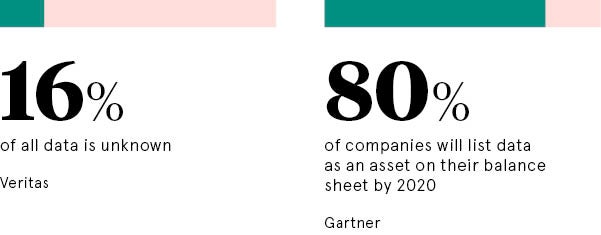You can download the full Customer Experience & Loyalty report here.
B2B organisations are increasingly understanding that data is a major asset that can provide great value to the business. But simply hoarding as much data as possible does not equate to value. Companies therefore must focus their efforts on gaining access to the information that will truly make a difference to their business performance.
Businesses typically use storage models that scale the costs according to usage, making vast data collection an expensive task. Most data stored in organisations will provide little value, either because there is no need to hold on to it or they lack the ability to use it. All too often, businesses just don’t know what data they have.
“Organisations need to undertake an investigative process to expose all the areas where they are currently hoarding data, whether they are using it or not, and why,” says Gareth Edwards, head of data science at Softwire, a software development firm. “Only once this exercise has been completed can any business really understand which data sets are of most value and which are being unnecessarily collected and stored.”
In most organisations, the grim reality is that information is all over the place. On average, 16 per cent of data is unknown, according to Veritas’s 2017 Data Genomics Index. The growth of unstructured data shows no signs of slowing, either, with a 50 per cent jump in the number of unknown files in organisations between 2016 and 2017.
It will ultimately be the role of people, ensuring the right questions are asked, that brings success
Digital transformation is ultimately defined by the value of information, so addressing this soaring volume of unknown files with appropriate data management tools is crucial in turning that data into genuinely useful insights for the business.
“This will allow businesses to deploy data classification tools that can scan and tag data in a granular, intelligent and automated manner to help them quickly discover, analyse and access it and on-demand,” says Jason Tooley, VP Northern Europe at Veritas.
Successful utilisation of data also relies on people. The managers in a B2B organisation know where the value comes from, and they know what answers they lack to create that value. But simply knowing what are the right questions to ask for data is not enough – they must communicate better with IT to develop systems that can find the answers.

Consumer brands are often perceived to be ahead of B2B companies when it comes to generating value from data, though this may be because their attempts to profile customers are more visible. B2B businesses selling devices, machines or tangible systems, in fact, generally have more valuable data -processing opportunities, particularly around areas like preventive maintenance and configuration optimisation.
The Internet of Things, which involves connecting objects with internet-enabled sensors that speak to each other, is also more prevalent in B2B scenarios and is one of the most powerful methods for collecting, processing and ultimately gaining value from data.
“What is complicated for B2B brands is when they produce a subsystem which is integrated in a larger system by their client – itself selling the larger system to the final customer,” says Yannick Meiller, assistant professor of information and operations management at ESCP Europe, the business school. “This is the case of Valeo in the car industry. The subsystem may be equipped with many sensors, but the data is captured by the main system, and therefore by the producer of this larger system.”
Accepting there is significant value in data is only the first step to realising its worth. B2B businesses must implement technologies and processes that ensure the correct data is collected and then integrated and analysed to find context. It will ultimately be the role of people, ensuring the right questions are asked, that brings success.
You can download the full Customer Experience & Loyalty report here.


